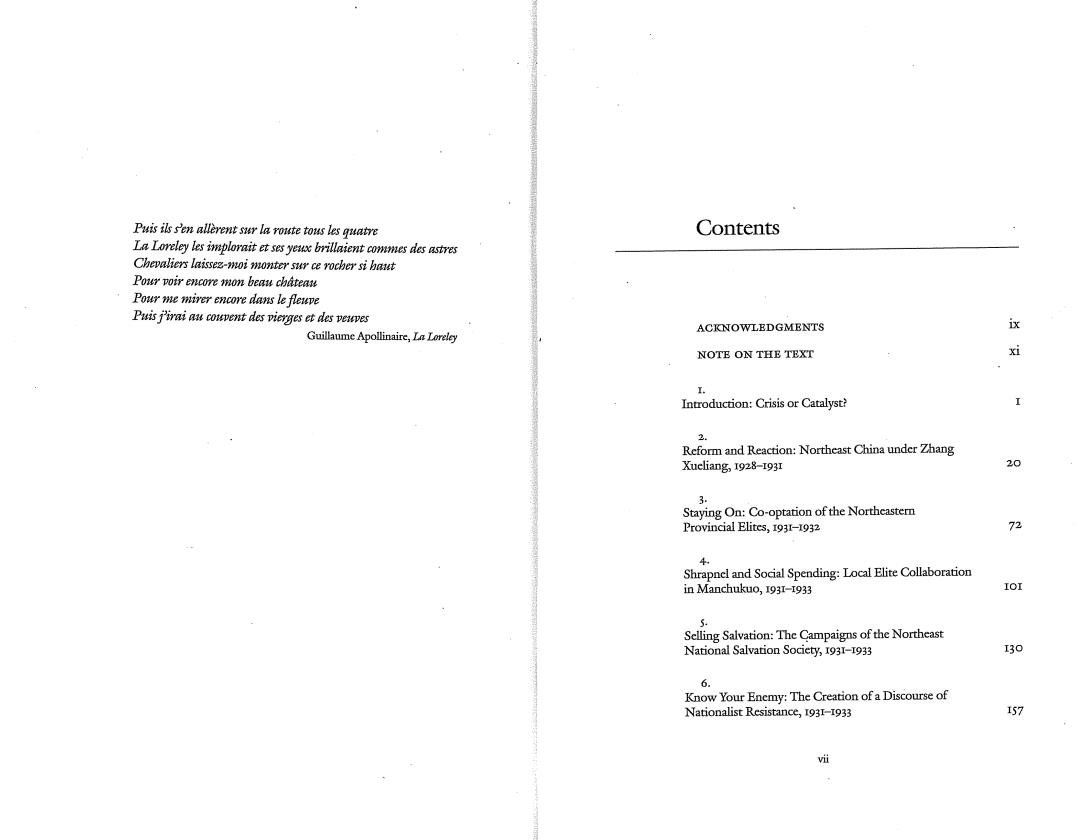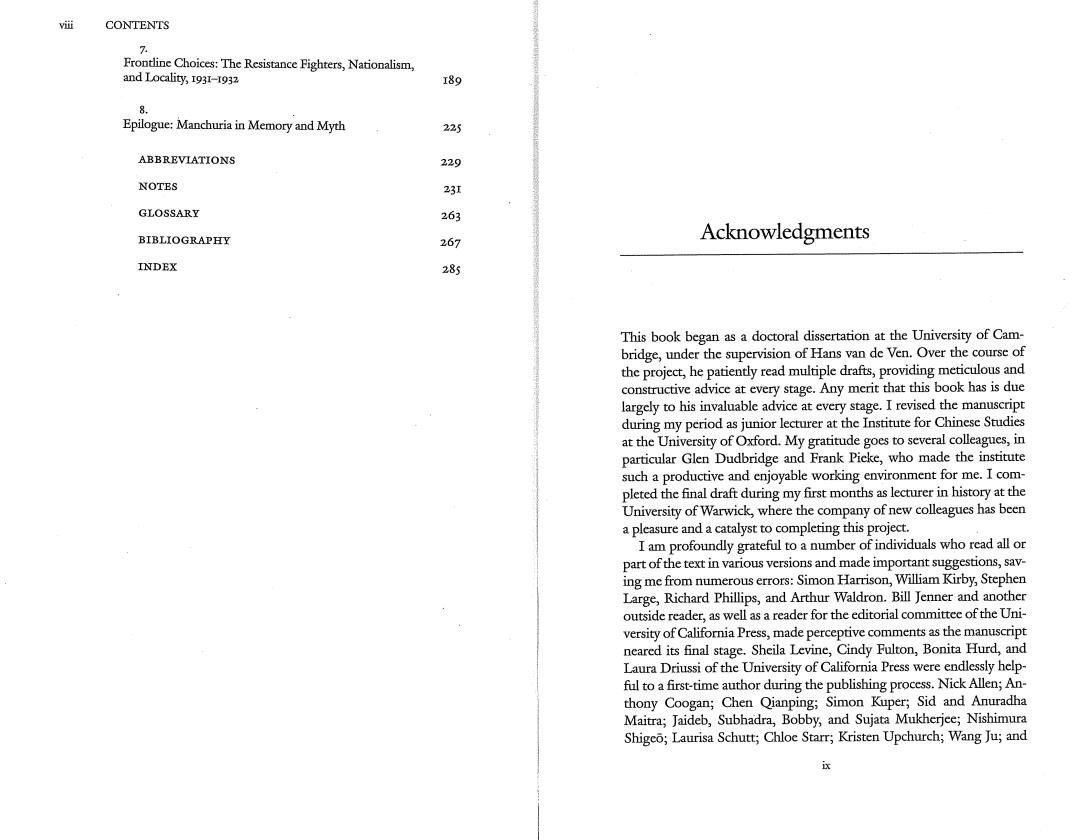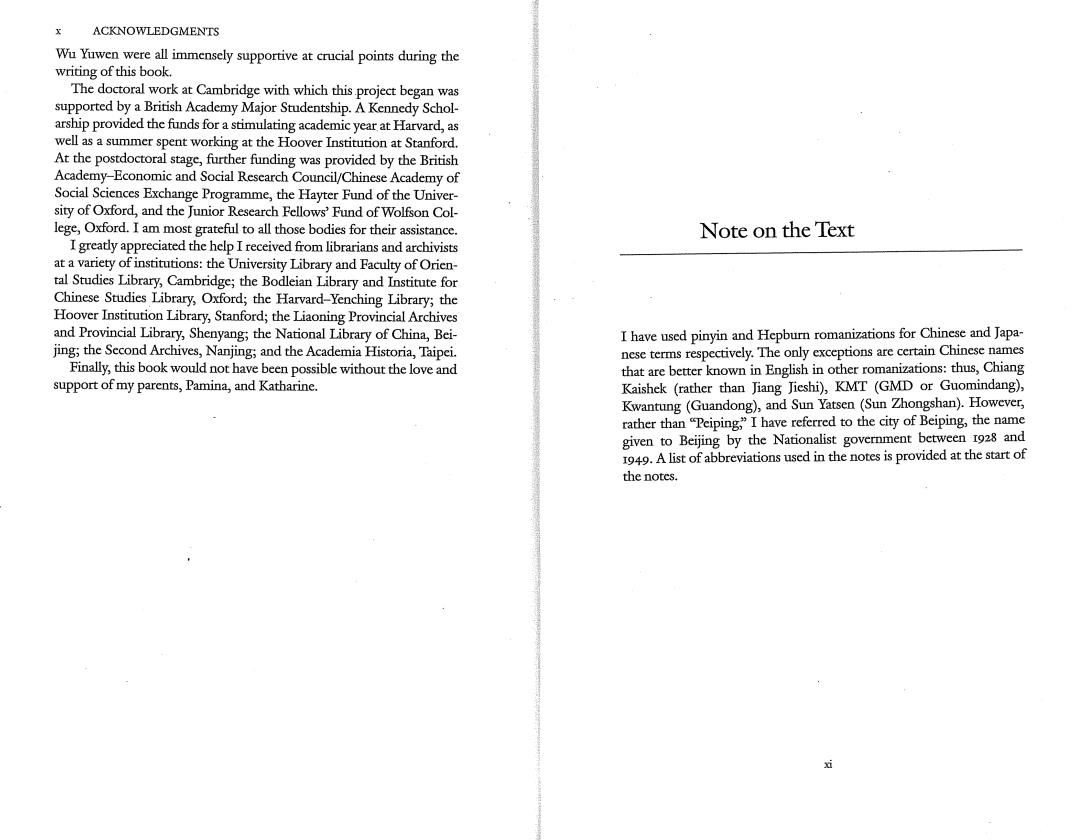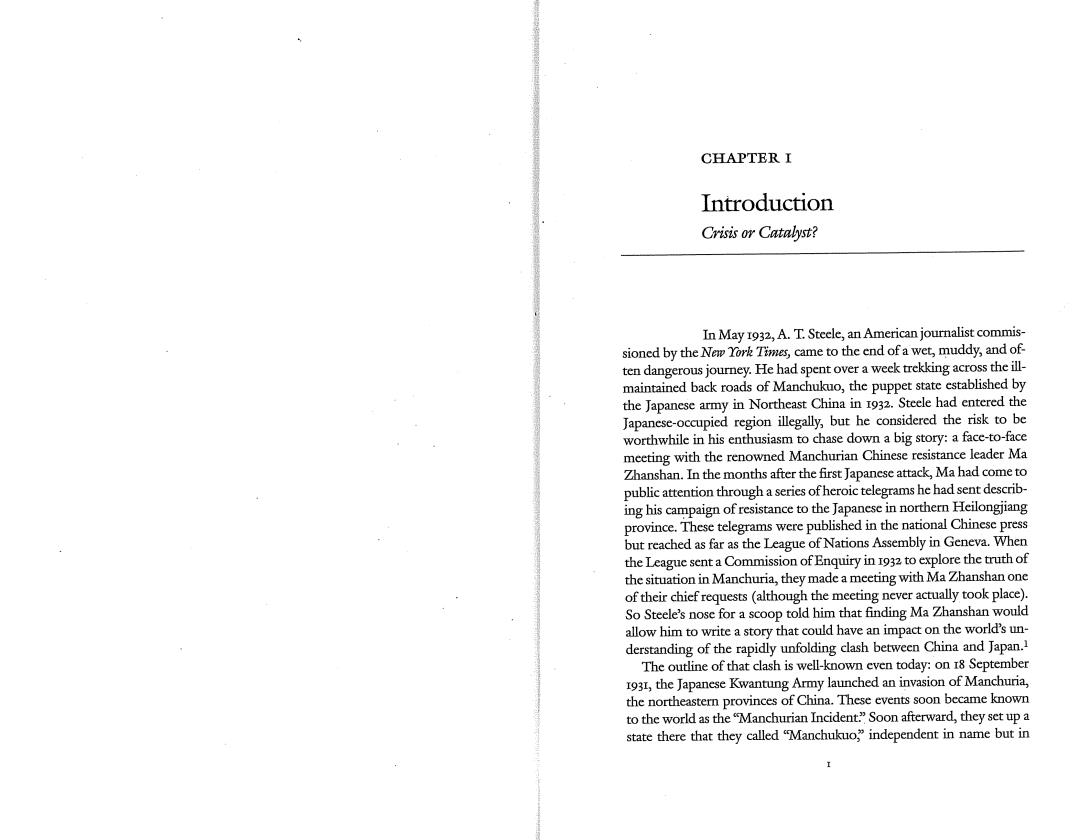
中研院民族所圖書館 bsnay M56 30520020558103 D6D The Manchurian Myth Nationalism,Resistance,and Collaboration in Modern China Rana Mitter 屁目 呢骊闲 产 高醫 UNIVERSITY OF CALIFORNIA PRESS Berkeley Los Angeles London t1999>g4e

Puis ils s'en allerent sur la roite tous les quatre Contents La Loreley les implorait et ses yeux brillaient commes des astres Chepaliers laissez-moi monter sur ce rocher si haut Pour voir encore mon beau chiteau Pour me mirer encore dans le fleuve Puis pirai au couvent des vierges et des veuves ACKNOWLEDGMENTS Guillaume Apollinaire,La Loreley NOTE ON THE TEXT xi I. Introduction:Crisis or Catalyst? I 2. Reform and Reaction:Northeast China under Zhang Xucliang,I928-1931 20 3. Staying On:Co-optation of the Northeastern Provincial Elites,1931-1932 2 4 Shrapnel and Social Spending:Local Elite Collaboration in Manchukuo,1931-1933 IOI Selling Salvation:The Campaigns of the Northeast National Salvation Society,I931-1933 I30 6. Know Your Enemy:The Creation of a Discourse of Nationalist Resistance,I931-1933 157 vii

碰 CONTENTS 7. Frontline Choices:The Resistance Fighters,Nationalism, and Locality,1931-1932 I89 8, Epilogue:Manchuria in Memory and Myth 225 ABBREVIATIONS 229 NOTES 231 GLOSSARY 263 BIBLIOGRAPHY 267 Acknowledgments INDEX 285 This book began as a doctoral dissertation at the University of Cam- bridge,under the supervision of Hans van de Ven.Over the course of the project,he patiently read multiple drafts,providing meticulous and constructive advice at every stage.Any merit that this book has is due largely to his invaluable advice at every stage.I revised the manuscript during my period as junior lecturer at the Institute for Chinese Studies at the University of Oxford.My gratitude goes to several colleagues,in particular Glen Dudbridge and Frank Pieke,who made the institute such a productive and enjoyable working environment for me.I com- pleted the final draft during my first months as lecturer in history at the University of Warwick,where the company of new colleagues has been a pleasure and a catalyst to completing this project. I am profoundly grateful to a number of individuals who read all or part of the text in various versions and made important suggestions,sav- ing me from numerous errors:Simon Harrison,William Kirby,Stephen Large,Richard Phillips,and Arthur Waldron.Bill Jenner and another outside reader,as well as a reader for the editorial committee of the Uni- versity of California Press,made perceptive comments as the manuscript neared its final stage.Sheila Levine,Cindy Fulton,Bonita Hurd,and Laura Driussi of the University of California Press were endlessly help- ful to a first-time author during the publishing process.Nick Allen;An- thony Coogan;Chen Qianping;Simon Kuper;Sid and Anuradha Maitra;Jaideb,Subhadra,Bobby,and Sujata Mukherjee;Nishimura Shigeo;Laurisa Schutt;Chloe Starr;Kristen Upchurch;Wang Ju;and ix

x ACKNOWLEDGMENTS Wu Yuwen were all immensely supportive at crucial points during the writing of this book. The doctoral work at Cambridge with which this project began was supported by a British Academy Major Studentship.A Kennedy Schol- arship provided the funds for a stimulating academic year at Harvard,as well as a summer spent working at the Hoover Institution at Stanford. At the postdoctoral stage,further funding was provided by the British Academy-Economic and Social Research Council/Chinese Academy of Social Sciences Exchange Programme,the Hayter Fund of the Univer- sity of Oxford,and the Junior Research Fellows'Fund of Wolfson Col- lege,Oxford.I am most grateful to all those bodies for their assistance. Note on the Text I greatly appreciated the help I received from librarians and archivists at a variety of institutions:the University Library and Faculty of Orien- tal Studies Library,Cambridge;the Bodleian Library and Institute for Chinese Studies Library,Oxford;the Harvard-Yenching Library;the Hoover Institution Library,Stanford;the Liaoning Provincial Archives and Provincial Library,Shenyang;the National Library of China,Bei- I have used pinyin and Hepburn romanizations for Chinese and Japa- jing;the Second Archives,Nanjing;and the Academia Historia,Taipei. nese terms respectively.The only exceptions are certain Chinese names Finally,this book would not have been possible without the love and that are better known in English in other romanizations:thus,Chiang support of my parents,Pamina,and Katharine. Kaishek (rather than Jiang Jieshi),KMT (GMD or Guomindang), Kwantung (Guandong),and Sun Yatsen(Sun Zhongshan).However, rather than"Peiping,I have referred to the city of Beiping,the name given to Beijing by the Nationalist government between 1928 and 1949.A list of abbreviations used in the notes is provided at the start of the notes

CHAPTER I Introduction Crisis or Catalyst? In May 1932,A.T.Stecle,an American journalist commis- sioned by the New York Times,came to the end of a wet,muddy,and of- ten dangerous journey.He had spent over a week trekking across the ill- maintained back roads of Manchukuo,the puppet state established by the Japanese army in Northeast China in 1932.Steele had entered the Japanese-occupied region illegally,but he considered the risk to be worthwhile in his enthusiasm to chase down a big story:a face-to-face meeting with the renowned Manchurian Chinese resistance leader Ma Zhanshan.In the months after the first Japancse attack,Ma had come to public attention through a series of heroic telegrams he had sent describ- ing his campaign of resistance to the Japanese in northern Heilongjiang province.These telegrams were published in the national Chinese press but reached as far as the League of Nations Assembly in Geneva.When the League sent a Commission of Enquiry in 1932 to explore the truth of the situation in Manchuria,they made a mecting with Ma Zhanshan one of their chief requests(although the meeting never actually took place). So Steele's nose for a scoop told him that finding Ma Zhanshan would allow him to write a story that could have an impact on the world's un- derstanding of the rapidly unfolding clash between China and Japan. The outline of that clash is well-known even today:on 18 September 1931,the Japanese Kwantung Army launched an invasion of Manchuria, the northeastern provinces of China.These events soon became known to the world as the "Manchurian Incident."Soon afterward,they set up a state there that they called "Manchukuo,independent in name but in